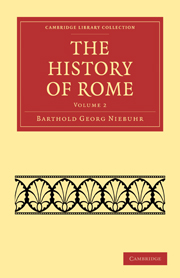Book contents
- Frontmatter
- PREFACE
- Contents
- INTRODUCTION
- The Latin State
- The League with the Latins
- Of the Colonies
- On the Rights of Isopolity and Municipium
- On the Franchise of the Latins
- The League with the Hernicans
- The Wars with the Volscians and Æquians, down to the end of the Veientine War
- The Office of Warden of the City
- The Internal Feuds of the Patricians
- Of the Public Land and its Occupation
- The Assignments of Land before the time of Sp. Cassius
- The Agrarian Law of Sp. Cassius, and his Death
- The seven Consulships of the Fabii
- The Veientine War
- Internal History from the Destruction of the Fabii to the first Pestilence
- The Legend of Coriolanus
- The Wars with the Volscians and Æquians down to the Peace of 295
- The Æquian War down to the Decemvirate
- Disasters and extraordinary Phenomena
- Civil History of the eleven Years preceding the Decemvirate
- The first Decemvirs, and their Laws
- The second Decemvirate
- The first Year after the Restoration of Freedom
- Civil Commotions down to the Constitution of 311
- The Consular Military Tribunate
- The Censorship
- Civil Affairs from the Year 311 down to the last Veientine War
- On the Pay of the Troops
- The Wars down to the Last with Veii
- The last War with Veii
- The other Wars down to that with the Gauls
- Internal History down to the War with the Gauls
- Physical History from 305 to 365
- On the Gauls, and their Immigration into Italy
- The War with the Gauls, and the Taking of Rome
- On the Olympiad and Year of the Taking of Rome
- Rome after the Departure of the Gauls
- The Wars down to the Reform of 384
- Civil History down to the Year 374
- Appendix I On the Roman Mode of Partitioning Landed Property, and on the Limitatio
- Appendix II On the Agrimensores
On the Rights of Isopolity and Municipium
Published online by Cambridge University Press: 01 June 2011
- Frontmatter
- PREFACE
- Contents
- INTRODUCTION
- The Latin State
- The League with the Latins
- Of the Colonies
- On the Rights of Isopolity and Municipium
- On the Franchise of the Latins
- The League with the Hernicans
- The Wars with the Volscians and Æquians, down to the end of the Veientine War
- The Office of Warden of the City
- The Internal Feuds of the Patricians
- Of the Public Land and its Occupation
- The Assignments of Land before the time of Sp. Cassius
- The Agrarian Law of Sp. Cassius, and his Death
- The seven Consulships of the Fabii
- The Veientine War
- Internal History from the Destruction of the Fabii to the first Pestilence
- The Legend of Coriolanus
- The Wars with the Volscians and Æquians down to the Peace of 295
- The Æquian War down to the Decemvirate
- Disasters and extraordinary Phenomena
- Civil History of the eleven Years preceding the Decemvirate
- The first Decemvirs, and their Laws
- The second Decemvirate
- The first Year after the Restoration of Freedom
- Civil Commotions down to the Constitution of 311
- The Consular Military Tribunate
- The Censorship
- Civil Affairs from the Year 311 down to the last Veientine War
- On the Pay of the Troops
- The Wars down to the Last with Veii
- The last War with Veii
- The other Wars down to that with the Gauls
- Internal History down to the War with the Gauls
- Physical History from 305 to 365
- On the Gauls, and their Immigration into Italy
- The War with the Gauls, and the Taking of Rome
- On the Olympiad and Year of the Taking of Rome
- Rome after the Departure of the Gauls
- The Wars down to the Reform of 384
- Civil History down to the Year 374
- Appendix I On the Roman Mode of Partitioning Landed Property, and on the Limitatio
- Appendix II On the Agrimensores
Summary
The fact that the Latins by virtue of the league enjoyed the privilege of isopolity, has likewise been preserved by Dionysius alone. If he had considered this as no more than the renewal of a previous mutual relation, it would not be very surprising that nothing appears about it in the articles of the treaty which he has recorded: but the omission is remarkable in so circumspect a writer, because he regards this isopolity as a new and high privilege conferred on the Latins. I am inclined to suspect that he did not find and insert his extract from the original instrument, till after he had written the passages just quoted and the others which even contradict it, nay till after he had publisht his work; and moreover that either nothing was said about isopolity in the few articles selected out of a great number by the Latin annalist from whom he took his account, because it was implied in the notion a league between equals, or that the annalist had retained the old lawterm, which the forein historian could not understand. In the other passages likewise he was treading in the footsteps of an annalist who had written in plain terms of certain civic rights having been granted: he was far too conscientious to interpolate a clause in his report of the treaty, for the purpose of justifying his assertions: and he may have neglected to correct the statements in other places which might now have struck him as erroneous.
- Type
- Chapter
- Information
- The History of Rome , pp. 49 - 75Publisher: Cambridge University PressPrint publication year: 2010First published in: 1832



